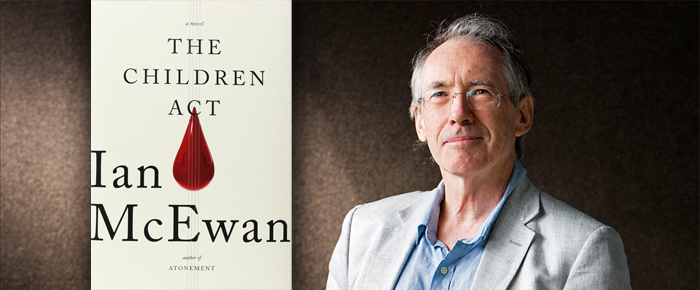
By Heidi Simmons
—–
The Children Act
by Ian McEwan
Fiction
—–
Any personal relationship takes work to maintain. Marriages are especially complicated – children or no children, careers, extended family – there are many intimate things that can build up over time and take a toll. In Ian McEwan’s, The Children Act (Doubleday, 223 pages) some relationships are overwhelming.
The story is about Fiona. Nearly sixty, she has been married for thirty plus years to her husband Jack. They haven’t had sex in months and being 60 himself, Jack longs for a passionate affair afraid he’ll never have sex again. Jack is a professor of ancient history and Fiona suspects she knows exactly who he really wants.
Jack loves Fiona, but doesn’t understand what’s happened that made her become so distant. He just wants to talk about it. Fiona can’t and won’t. She is broken and damaged by the last few high-profile decisions she had to make as presiding judge in family court as a High Court judge in London. Everyday she must make life-changing decisions that impact families. The Children Act declares that the court must consider the welfare, well-being and interests of the child.
The case of Siamese twins, Mark and Matthew still haunts her. Mark’s little heart was supporting his conjoined brother whose enlarged head and dormant organs were stealing the life from Mark. Although Fiona is a well-respected judge and highly intelligent person, she struggles to maintain her composure and vulnerabilities. If the others only knew.
When Jack leaves, Fiona changes the locks. She has a new case that requires her immediate attention and she is happy to throw herself into the challenge. The child is Adam. He is a few months away from being 18 – an adult. He has leukemia and if he doesn’t have a blood transfusion he will either die or suffer irreparable damage. But Adam and his family are refusing treatment because of their religious belief as Jehovah’s Witnesses.
The boy is willing to die and his parents and the church elders believe it is the only choice their faith allows them to make. His death will be celebrated as a victory. The hospital disagrees and wants the court to make the decision since Adam is still a minor.
Because of her inner emotional state, Fiona decides to speak to the boy directly. It is an act somewhat unprecedented, but she must. The two engage in a mature conversation about his life and death situation. She asks Adam to play his violin and she sings with him. A moment of strange compassion and intimacy. Adam is certain he has convinced her to see his side –to let God’s will be done.
Back in court, Fiona makes her ruling. It’s another high-profile case and it makes all the papers. She wonders if Jack read about it. He has not been in touch, no texts or voicemails; but when she gets home Jack is waiting at the door. Exhausted, she is glad to see him. Fiona lets Jack back into her life. He must sleep in the guest room and they don’t speak.
The court intervenes. Adam lives and he realizes he owes his life to Fiona. Her ruling has enlightened him. He knows that his parents were secretly grateful for her ruling. He believes it was a strategy on their part to save him from the religion that binds them. Adam seeks to talk about his case with Fiona, the only clear voice of reason. She refuses. He stalks her and she finds herself confused and out of control. She likes the boy, cares about him, but is not allowed to associate with him.
Her inner strength prevails and Fiona finds comfort with the distant and quiet relationship at home with Jack.
Fiona is one of the most interesting fictional character I’ve read in a long time. Her life has just moved ahead and she knows there is nothing she can do. Yes, they wanted children. But that time has passed. She loves her work, but it consumes her. It takes a toll as she has to be the secular voice in a world where crazy religious beliefs get in the way of productive life choices and family harmony.
The reader gets just enough of Fiona’s inner voice. Her actions speak louder than words. Author McEwan fills the pages with legal arguments – all fascinating and compelling courtroom drama. What he does so well, is put the reader on the bench with Fiona where we feel the pressure of her job. At the same time, her rulings come as a surprise. We think we know, but we really don’t. Through Fiona we get a thoughtful and intelligent understanding of the courtroom dilemmas and its repercussions.
There is no deep thematic meaning in The Children Act. It is a straightforward slice of life that captures the current state of family court (in London at least) and the people who must make difficult and life altering decisions. McEwan never takes the easy way out with clichéd affairs and torrid sex.
One could hope that all judges would be as thoughtful and intelligent as Fiona. Yet Fiona is a modern woman with her own challenges and flaws. She is only human and sometimes life can be overwhelming no matter how hard you work at it.












































